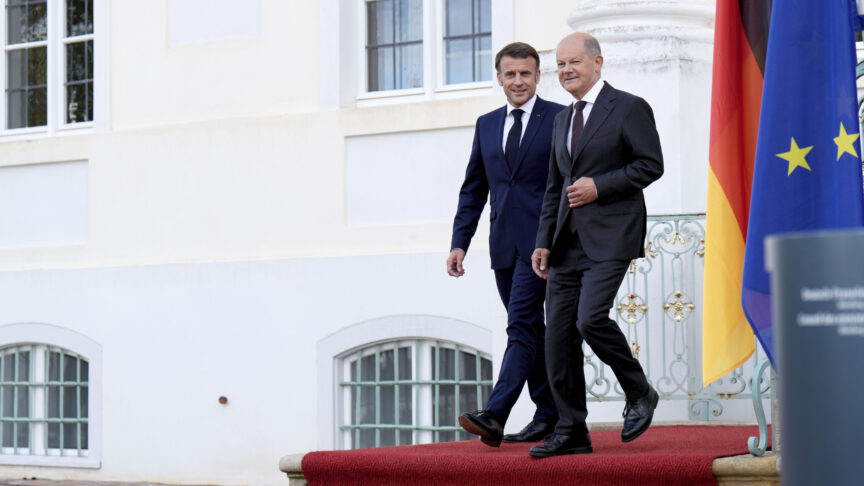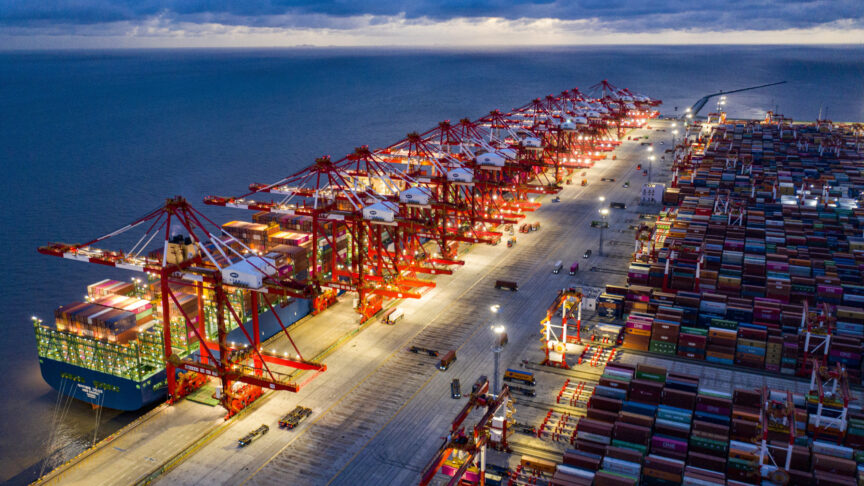Macron’s Charlemagne challenge to Berlin
Emmanuel Macron both lay down a gauntlet and held out a hand to Angela Merkel in Aachen. But the chancellor seized neither.
This year’s Charlemagne Prize ceremony promised political drama of the highest calibre. With Angela Merkel presenting the honour – which acknowledges “work done in the service of European unification” – to French president Emmanuel Macron in the German city of Aachen last week, the chancellor had the chance to articulate a response to Macron’s ambitious plans for the European Union. Indeed, a reply was long overdue, given that he first set out his vision the day after the September 2017 German federal election. Would the Germans match the French in their aspirations for the European project? Crucially, would Berlin signal that it was moving towards accepting Macron’s proposals for eurozone reform?
To be sure, Macron did everything he could to pitch the event as a decisive moment in European history. The night before, he spent 20 minutes addressing the German public in an interview with the ARD television channel. Despite the strong ties between Germany and France, such appearances are rare. The interview provided yet another display of the ‘Macron method’: he understands that, ultimately, change happens in the heads of the electorate. He also believes that success both at home, and at the EU level, go hand in hand – and that a large part of such success only works through French-German cooperation. Against that backdrop Macron had two messages for the German public. The first was one of reassurance that France had started to change – and to engage in reform – since he became president in May 2017. The second was a challenge: if the eurozone was to survive and prosper, Germany also needed to change. He pushed even harder on this point in his acceptance speech the next day, calling for the country to loosen up on its “fetish” for national budget and trade surpluses.
In his Charlemagne acceptance speech, he laid out four imperatives, alluding to the “categorical imperative” of Emmanuel Kant: let’s not be weak; let’s be united; let’s not fear; let’s not wait. But his line of argument was far from merely philosophical. It was fundamentally political, and challenging to Berlin.
This was a potentially historic moment: the French president, on German soil, receiving the Charlemagne Prize, at a time of great uncertainty for Europe – and all broadcast live on German television
The chancellor’s style is known to be rather restrained, so it is no surprise that on this occasion Merkel gave yet another Merkel. In her introduction speech at the ceremony she essentially refused to join in Emmanuel Macron’s mise en scène. She refrained from giving a substantive response to Macron’s Sorbonne speech, and did not attempt to match its intellectual depth. Unsurprisingly, observers gave her speech low marks. The whole spectacle was not helped by the fact that the waiting Macron had been seated several rows behind Merkel when she gave her speech, so that she looked as though she was talking to other people about him rather than addressing the president himself.
So was this all a waste of time? Macron will be watching out to see whether this very prominent appearance in Aachen help his ambitions both at home, in Germany, and with EU matters. In France, he hopes his words will send a message that his country is back, engaging and challenging its neighbour over the Rhine. In Germany, his aim will be to have strengthened the trust of the German public in France. And with Merkel herself? Ultimately, Macron’s engagement with the German public could also help the chancellor to widen her approval base for a compromise on eurozone reform that she promised to engineer with Macron before the EU summit in June 2018.
This was a potentially historic moment: the French president, on German soil, receiving the Charlemagne Prize, at a time of great uncertainty for Europe – and all broadcast live on German television. So, given this, we may come to look back on this as an opportunity missed – deliberately – by Merkel. This is a chancellor who has come through yet another federal election and who is now surely entering the twilight of her time in power: a situation which bestows a certain freedom to act and take chances. She might have seized the occasion to showcase the maturity of political relations between France and Germany, two countries firmly embedded in the EU, and, despite all differences, still willing to move Europe forward.
France and Germany’s recent past has been punctuated by dignified, seminal encounters between leaders that reflect the countries’ difficult history: Chancellor Kohl and President Mitterrand holding hands in Verdun; Presidents Gauck and Hollande at SS massacre site Oradour-sur-Glane; Presidents Steinmeier and Macron on first world war battlefield Hartmannswillerkopf. France and Germany’s future now awaits – even demands – new symbolic encounters. Aachen this year might have been that moment. But its enduring impression is set to be of one hand held out ungrasped.
The European Council on Foreign Relations does not take collective positions. ECFR publications only represent the views of their individual authors.


